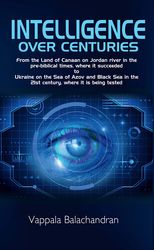Whenever I think of Vappala Balachandran, senior to me by a decade in the Indian Police Service, I am reminded of the title of B.K. Nehru’s autobiography, Nice Guys Finish Second. Balachandran superannuated as the second-in-command to the chief of India’s external intelligence agency nearly two decades ago. Since then, he has been prolific in writing on subjects related to security and intelligence.
Balachandran’s latest book, Intelligence over Centuries, is a sweeping study covering the entire gamut of intelligence work over centuries. He recalls the biblical story of the spying done on instructions of the leaders of the Israelis, Moses and Joshua, as they progressed through the desert to their “promised land”. The author also quotes profusely from the ancient texts of Thiruvalluvar, Chanakya and Sun Tzu regarding statecraft and the art of intelligence.
Balachandran covers a wide spectrum, including the history of the evolution of intelligence, secret intelligence, covert operations, Indian intelligence, other major intelligence organisations, intelligence liaison, intelligence failure, counter-intelligence, counterterrorism and technical aids. There is a vast readership today for books related to intelligence and security. There are many anecdotes to keep such readers enthused, but the general reader may be disappointed that not enough has been revealed about some of the recent Indian intelligence operations.
Balachandran has been one of the most perceptive observers of the security scenario in our country and around the world. That is the chief reason why this book is a must-read for intelligence professionals or for anyone who has a serious interest in strategic issues. Balachandran’s historical narration helps us understand how the Indian police came to play a major role in the collection, analysis and dissemination of internal as well as foreign intelligence. It is interesting to note that Indian police officers set up the nucleus of Britain’s Security Service (MI-5) in 1910. Considering the fact that MI-5 and MI-6 later helped the Americans to set up the CIA, Indian police can perhaps claim to be the ‘mother of all intelligence organisations of the modern era’.
Yet, it seems that Balachandran is sceptical of the primary role assigned to police officers in India’s intelligence agencies. As he points out, collection, analysis and dissemination of intelligence demand skills distinct from the ability to maintain law and order. Those who differ may point out that with the increased intertwining of intelligence with counterterrorism, experts with experience in collection of criminal intelligence and investigation of crime need to be involved more.
In addition, those who have come through the gruelling selection process of the Union Public Service Commission need not be considered any less competent than Oxbridge and Ivy League scholars. Having said this, one must not decry the need to induct the best professional and technological talent from varied fields. Balachandran cites some examples of how those who were inducted from universities and from unrelated fields of activity rose to the highest positions in some intelligence organisations. One wishes he had probed deeper into how these organisations manage to assure career progression on a fair basis. That, in fact, is the biggest problem that a spy chief faces even when he is given a free hand.
The author is former chief, Research and Analysis Wing.
Intelligence Over Centuries
By Vappala Balachandran
Published by Indus Source Books
Pages 306; price Rs620


